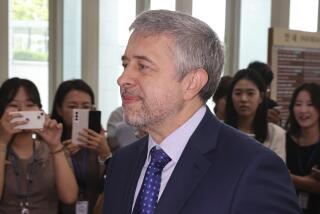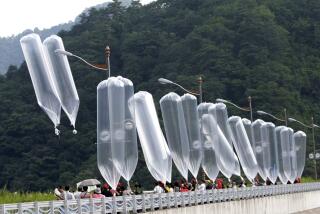THE MALTA SUMMIT : Bush, Gorbachev Reportedly to Take Up Korean Issues : Asia: Seoul wants the Soviet leader to persuade Pyongyang to open up its society and not produce arms-grade nuclear material.
SEOUL — President Bush has agreed to take up issues that deal with Korea in his weekend talks with Soviet President Mikhail S. Gorbachev, according to reports that appeared Friday in South Korean newspapers.
The press quoted a spokesman for President Roh Tae Woo, who is traveling in Europe, as saying that Roh had talked with Bush on Wednesday by phone from London. He said Bush had agreed to ask Gorbachev to make an effort to persuade Communist North Korea to open up its society and not produce nuclear material that could be used in weapons.
South Korean and U.S. officials here have said they expect no immediate change in North Korea’s policy of isolation, but the recent disclosure that North Korea is constructing a nuclear fuel processing plant has added a sense of urgency to the situation.
North Korea, which has no nuclear power plants, is known to have only a few nuclear reactors, which are used for research purposes.
A senior Western diplomat said Friday that the North Korean processing plant poses a threat to South Korea, which has no nuclear weapons. The United States has about 43,000 troops in South Korea that are equipped with tactical nuclear weapons.
U.S. officials here said the United States has already urged Moscow to try to persuade North Korea, which has signed the Nuclear Non-Proliferation Treaty, to accept international inspection of its nuclear facilities. U.S. diplomats have made the same request in direct contact with North Korean officials in Beijing.
But their response, according to a diplomat here, “has been opaque.” He said the North Koreans are “opaque on all subjects.”
Korean scholars who are often consulted by the South Korean government have expressed hope that North Korea may be on the verge of adopting a dramatic change in policy that would lead to diplomatic recognition of South Korea.
Prof. Han Sung Joo of Korea University said North Korean President Kim Il Sung knows that his country will fall further and further behind South Korea in economic strength if he clings to the present economic system.
Events in East Europe, Han said, have emphasized the gap in economic development between West and East, and “the fact that the longer you wait, the bigger the gap.”
Prof. Rhee Sang Woo of Sogang University said the most urgent task for Kim “is to launch his own version of perestroika ,” a reference to the restructuring program undertaken by Gorbachev in the Soviet Union.
Gaston J. Sigur Jr., an assistant secretary of state in the Ronald Reagan Administration, reportedly told U.S. diplomats here that officials he met on a recent visit to North Korea told him that the country “realizes that it is out of step and needs to change.”
Sigur’s report, quoted by a reliable source, represents the only direct signal of change in North Korea that the United States has received.
But Western diplomats see little likelihood of meaningful change there. “Kim Il Sung is a pretty old leopard,” one said, “and I don’t think he’s capable of changing his spots.”
Only a handful of top leaders in North Korea are aware of developments in the outside world, one diplomat said, “so any changes like those in East Europe are unlikely at any time soon.”
Because of the broad interchange between East and West Germany, which has gone on for years, “the Germans are already unified mentally,” Prof. Han said.
On the other hand, North and South Koreans are entirely isolated from each other. Radio, television, postal and telephone contacts are not permitted. Since the end of the 1950-53 Korean War, fewer than 2,000 Koreans have crossed the fortified zone that separates the two countries, and most of those were government officials.
In 1972, the two governments announced that they would discuss reunification, but in all the on-again-off-again talks that have taken place--by government officials, Red Cross officials, on economic topics and athletic competitions--not a single institutional change has come about.
Experts here are reluctant to guess at how Gorbachev might respond to any Bush overture regarding the Koreas.
“The Soviets are uncomfortable with North Korea,” the senior Western diplomat said.
The Soviet Union has been only a step or two behind the example set by other East European governments in improving relations with South Korea. Hungary and Poland, which established full diplomatic ties with South Korea this year, were the first Communist nations to do so. The senior Western diplomat said he had been told that negotiations are under way to establish consular-level ties between Moscow and Seoul. This would be one step below full diplomatic recognition.
Roh Tae Woo, Moscow has established a trade office in Seoul, and its chief official here talked openly Monday about when--not if--Moscow will extend official recognition to the Seoul government.
“I don’t want to say when we will be able to set up normal diplomatic relations,” the official, Valery K. Nazarov, said. “As you know, we are a more open country than we were, and will become more open. There will be a concrete result soon.”
The Soviets, the senior Western diplomat said, “are falling all over themselves” to get South Korean technology and management skills.
“They are offering the South Koreans all sorts of opportunities,” he said, “but the Koreans are responding, ‘We’ll cooperate--after you establish diplomatic relations with us.’ The South Koreans are waging economic diplomacy very skillfully.”
More to Read
Sign up for Essential California
The most important California stories and recommendations in your inbox every morning.
You may occasionally receive promotional content from the Los Angeles Times.










